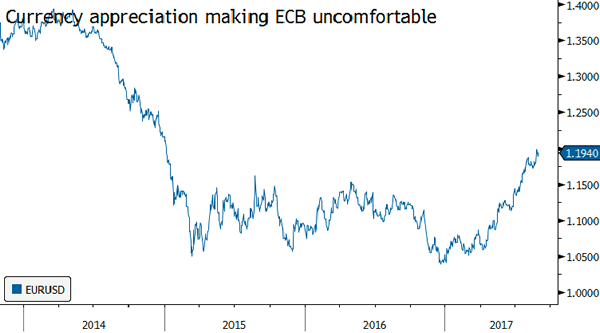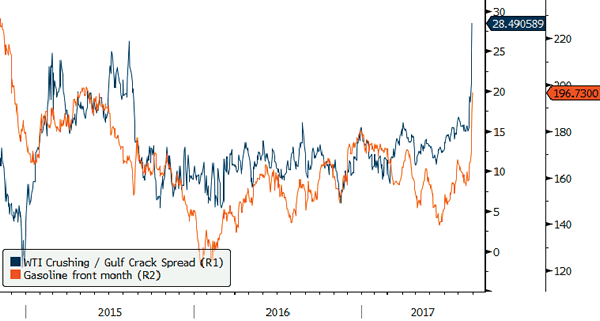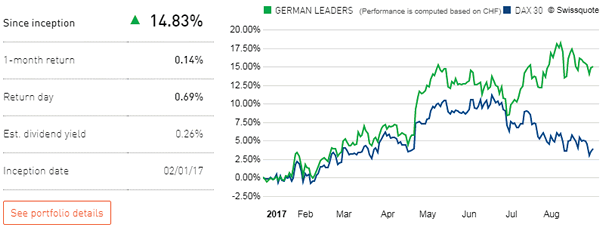- ECB: Let The Games Begin – Peter Rosenstreich
- Tensions Are Mounting Ahead Of ECB And Fed Meetings – Arn
- ud Masset
- Hurricane Harvey Impacts Crude Oil Prices – Yann Quelenn
- German Leaders
FX Market – ECB: Let the games begin
At this week’s European Central Bank policy meeting we expect the Draghi will signal a step-away from emergency measure by removal of easing bias and deceleration in pace of asset purchases. Yet, details are not expected until next meeting at the end of October. In addition, the ECB president could emphasize new forward guidance on rates to lessen signaling effect of the actual change. To cushion the blow and avoid excessive Euro appreciation, Draghi will attempt to hide the clear meaning and stress that reduction is not tightening. This feat likely be accomplished by puzzling "Greenspan-like" language, stressing flexibility and eventually extending the asset program by six months, (slowing monthly pace of purchased to €30bn). Just enough information to place the seed of doubt in euro bulls mind.
The rational for removing emergence measure via the reduction of bond purchase is simple. The European economy has recovered strongly. According to members, European growth "was increasingly selfsustaining and hence had become less dependent on the current degree of monetary policy accommodation". This also supports our thinking that the ECB growth projections will be revised higher. However, inflations path remains subdued as even Augusts uptick was item specific and not broad-based. There is increasing discussion that reduction is less economic decision and more market structure driven choice. Should the ECB continue its €60bn monthly purchases, holding of German sovereign debt would reach its self-imposed limited to by a maximum of 33% of issuers bonds. Shortly after bond holding limits will be breached with other core EU nations. The ECB could adjust the limit, however ruling by the European Court of Justice and the German Constitutional Court indicated the purchase program is legal only if they refrain from monetary financing. Draghi in May indicated awareness of Treaty rules and had no intentions of challenging.
Friday ECB Nowotny stated that Euro moves shouldn’t be "overdramatized" and chance QE plan not fully ready until Dec. Already member are taking down expectations. Draghi careful comments in a speech in Sintra, generated volatility as yields and euro reacted significantly. The ECB will proceed cautiously with the removal of monetary stimulus, maintaining flexibility and controlling any excessive appreciation in Euro.

Economies – Tensions Are Mounting Ahead Of ECB And Fed Meetings
The week started fairly well for the greenback as investors reduced their short positions ahead of a full week of economic data. The first batch of data was quite encouraging with ADP employment change rising to 237k versus 185k expected and the second print on the second quarter GDP being revised to 3%q/q (annualised) from 2.6% initially estimated. The dollar index reversed the trend as it climbed back towards the 93 threshold. However, things started to deteriorate slightly on Thursday amid a mixed personal income and spending reports and flat inflation readings.
Indeed, personal spending and income came in roughly in line with expectations, though the former printed slightly lower, suggesting that personal consumption should continue to improve in the third quarter. Moreover, June’s personal spending was revised to the upside from a flat reading to +0.2%m/m. However, investors should remain cautious regarding the outlook as Hurricane Harvey will surely weigh on those measures in the coming months.
On the inflation front, the Fed’s favourite gauge matched expectation with the core personal consumption expenditure printing at 1.4%y/y in July, down from 1.5% in the previous month. This lacklustre inflation reading is of bad omen for the Fed monetary policy normalization process. However, the economy has recently gather momentum and it should translate into a pick-up in consumer prices at some point. It will just take time.
Expectations were quite high for the jobs report. NFPs were expected to trail ADPs with median forecast standing at 180k while wages were anticipated to have expanded 2.6%y/y in August. Nevertheless, it was a big miss as all those gauge missed market’s expectations. The US economy created only 156k non-farm jobs, while average hourly earnings grew 2.5%y/y. Finally, the unemployment rate ticked-up to 4.4%. On a more positive note, we remain cautious regarding August data in general as it has proved to be subject to significant statistical distortions. One therefore has to take those figures with a grain of salt. The market’s reaction was harsh with the dollar tumbling 0.50% against most of its G10 peers. Yet this negative USD sentiment didn’t last long as ISM manufacturing came in above expectations, printing at 58.8 versus 56.5 median forecast.
It was a bumpy week in the FX market as investors become nervous ahead of this week ECB meeting and next week Fed meeting. Traders are and will remain highly sensitive to economic data until September 20th. This going to be a busy week as many central bank will update their police stance. The RBA (Australia), BoC (Canada), BCB (Brasil), Riksbank (Sweden) and finally the ECB are expected. Be ready for a potentially bumpy week.
Economics – Hurricane Harvey Impacts Crude Oil Prices
The US Energy Department has released earlier last week inventories data which shows a decline of 5.932 million barrels during the week ending August 25. It is the ninth consecutive weeks of decline and crude oil had lost 1% and was now challenging its 6-week low before bouncing back.
Oil fundamentals are challenged by the tropical storm Harvey which is ravaging Houston and some US refineries out there are now closed temporarily. Yet, markets were clearly not fearing any potential shortages within the short-term as crude oil is most of the time very easy to replace. Any shortage longer than a week or ten day are usually driving crude oil prices higher. It now seems that some refineries will stay closed for at least two weeks and crude oil prices jumped 10%. This natural disaster has a significant impact on prices. Upside risks should likely persist within the next few weeks.
Other fundamentals are not very enthusiastic for the US refining industry. The trend in the rig count is bearish due to sustainable low prices. Numbers of rigs declined to 940 from a week earlier. Yet it is still up from last year. Now markets will start pricing in the next OPEC meeting late November. We do not consider that any production cut will be applied. The market share war between OPEC members and the US will continue and the US are likely to keep suffering.
Anyway, we keep on believing that upside pressures on oil are ahead of us. In particular, at the moment, there is a seasonal effect that should soon be back. In September the demand for crude oil normally increases as the summer season is over and overproducing oil is not a viable longterm project. Today’s low crude oil prices are definitely preparing tomorrow high prices.

Themes Trading – German Leaders
German companies remains the most valued in Europe. High-end manufacturing and solid governance continually make German equities a quality investment. German stocks are likely to experience volatility ahead of the federal election on 24 September, yet the expected outcome should provide the needed stability, therefore the longer-term outlook remains bright. Germany is the largest economy and a dominant political force in Europe, often steering policy decisions towards its own selfinterest. ECB overnight rate is expected to remain negative for another 12 months, but tightening monetary policy is approaching. Investors will look towards Germany’s fast growing companies for a higher rate of return. Worries over the effect of a stronger euro on Germany’s export-driven economy has weighed on the DAX bullish momentum. Yet despite the higher euro, European companies have revised their 2Q earnings higher by an average of 1%, the financial and automobile sectors being the strongest. An improving global trading environment, world-class brands and lagging valuation will keep investors interested in German corporate stocks. This Theme was built using the top German large and midcap companies.

